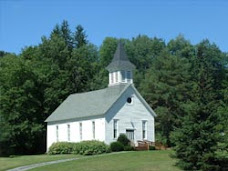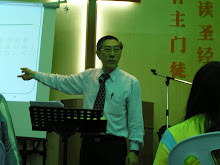Monday, October 13, 2008
Mid Tribulation Premillenial-Revised
The WEAKNESS of the midtribulation position is that the occurrence of the rapture is too predictable, exactly at the mid-point of the Daniel's 70 weeks. There are many scripture passages that indicate the Second Coming of the Lord and the rapture is not predictable. Matt. 24:37-39;Matt. 25:13; 1 Thess. 5:2-3.
Please allow me to restate the points that support the mid-tribulation position briefly:
1. No wrath of God on Christians;
2. No wrath of Satan on Christians;
3. Christ will return exactly at the midpoint of the 70 weeks of Daniel;
4. The prophecies in the Olivet Discourse apply only to Israel;
5. The time of Christ's return is exactly at the midpoint of the tribuation;
6. A multitude will enter the Millennium;
7. Jesus returns with the saints-No mention of going up raptured and then immediately returning.
Wednesday, October 1, 2008
What is the Universal Church? How should the church reflect her unity to the world? b. Conciliar
The Universal church is that general church of the whole congregation of the called-out believers, that make up of the Body of Christ, “The People of God.” as opposed to the local church, a congregation of believers meeting together for fellowship at a particular locale having a set of agreed beliefs and dogmas.
There are several forms the unity of the church can take even though generally unity of the universal church is desired and agreed. Four common forms are practiced; the first being “Mutual Recognition and Fellowship.” This is the most basic low-level of unity, recognizing each other as legitimate parts of the family of God, cooperating whenever in evangelistic crusades and fellowshipping whenever possible on an ad hoc basis.
The second level is “Conciliar Unity” when churches have organizational alliances to achieve their common purposes. They band together into council or association of churches. This is basically a cooperative fellowship while each church still retains its own identity. The unity is visible as well as spiritual.
The final type of unity is “Organic Unity” in which there is an actual creation of one organization in which separate identities are surrendered. Membership and ordination are joined.
I think the best form of unity that is Biblical is the “Conciliar Unity” as the Bible allows for variety as long as they stay with the Bible. The different denominations do not feel threaten when coming together to fellowship and cooperate in evangelistic efforts, fulfilling the functions of the church.
Saturday, August 30, 2008
What is the rightful model of Church governance? Theocratic only?
There are several forms of church government, the most basic four are: Episcopal, Presbyterian, congregational and a form of nongovernmental. While Episcopal and Presbyterian forms of church government have designated offices to rule the church; to which Jesus’ teachings seem to be against when he said: “Jesus said to them, "The kings of the Gentiles lord it over them; and those who exercise authority over them call themselves Benefactors. But you are not to be like that. Instead, the greatest among you should be like the youngest, and the one who rules like the one who serves. For who is greater, the one who is at the table or the one who serves? Is it not the one who is at the table? But I am among you as one who serves.” (Luke 22:25-27, NIV)
It is observed that both Jesus and Paul assigned the responsibility for discipline to the congregation rather than a bishop or an elder. However, there are also biblical objection to the congregational scheme of government; because it disregards the apostolic (or Episcopal) authority. It is noted also that there was a separation of the offices of bishop, elder, and deacon rather early in church history.
Gk: episkopoi (elders, deacons); Gk: Presbyteroi (overseers or bishops) are the two Greek words used in the New Testament for church leaders. It is noted in the New Testament, the leaders and the members are equally valuable and these two terms are interchangeable in Titus 1:5-7
I believe the rightful model of Church governance is theocratic only, whereby the elders or overseers, together with the congregation conduct themselves in accordance with the will of God to the best of their knowledge.
“Theocracy” comes from the Greek word “Theos” (of God, divine, according to God’s will.) There is no truly theocratic government on earth as such unless one can truly say he/she knows fully well what is the will of God and whatever he/she does is exactly according to the will of God as the following example shows.
An extreme form of “theocracy” is cited online posted on
AP, Thursday, March 02, 2006
Ave Maria: Domino's Pizza Founder Wants Taliban-style Theocracy In Florida
The AP reports today that a new
If Domino's Pizza founder Thomas S. Monaghan has his way, a new town being built in Florida will be governed according to strict Roman Catholic principles, with no place to get an abortion, pornography or birth control. ac
For that matter, the Episcopalian and Presbyterian or “non-govenmental” structure of church government can also be “theocratic” if the people conduct themselves according to the will of God to the best of their biblical knowledge.
The closest model is the Old Testament model whereby the king (David) ruled the nation of
Is there truly a “theocratic” church government today? Even some churches claim to be such as the Romans Catholic Church, please comment.
Tuesday, August 26, 2008
What is the Biblical understanding of Church?The church as "the people of God"
The English word "church" has various meanings. Webster gives the following definitions for the word church.
1. a building for public Christian worship. 2. a religious service in such a building. 3. (sometimes cap.) a. the world body of Christian believers; Christendom. b. any major division of his body; a Christian denomination. 4. a Christian congregation. 5. organized religion as distinguished from the state. 6. (cap) a. The Christian before the reformation. b. the Roman Catholic Church. 7. the profession of an ecclesiastic -V.C. 8. to perform a church service of thanksgiving for (a woman after child birth). [Go RI(a)on (DOA) the Lord's house).(1)
The Bible uses a few metaphors to represent the church. One of these metaphor is "the People of God".
The term "People of God" was first used in the Old Testament to the nation of Israel in covenant with God. (Exodus 15:13,16)
Paul wrote that it was God's decision to make believers His people:
And walk among them.
I will be their God,
And they shall be My people.”
(2 Corinthians 6:16, NKJV)
Millard J. Erickson says that "the concept of the church as the people of God emphasizes God's initiative in choosing them. He did not adopt an existing nation, but actually created a people for Himself."(2)God takes pride in the "people" He calls to be His own, He cares for and protects His people; he keeps them "as the apple of his eye" (Deut.32:10) and God expects His people to be holy.
This creates a problem for us. Is the church today the continuation of the Old Testament "People of God." or are we a totally new entity separate and displaced the OT "people of God"? Please comment!
Footnotes:
1.Webster's Universal College Dictionary (New York: Gramercy, 1997), p. 143.
2. Millard J. Erickson, "Christian Theology", 2nd Edition, (U.S.A.:Baker Publishing, 2005), 1045.

